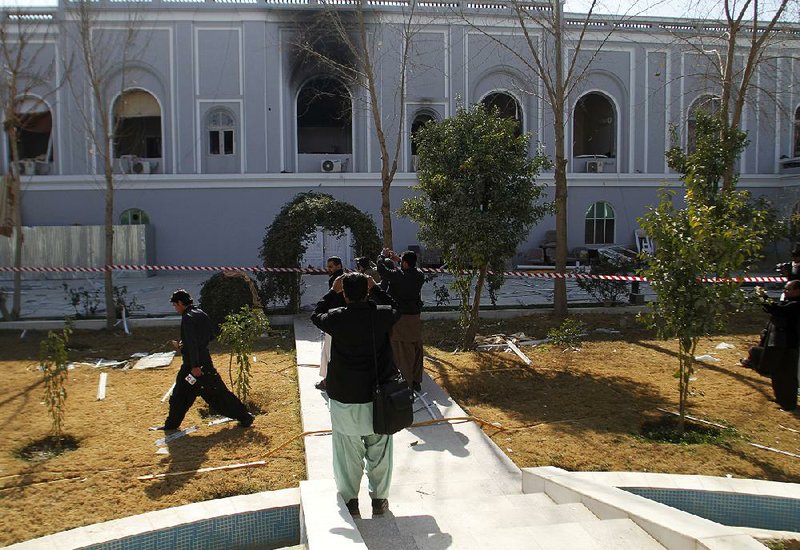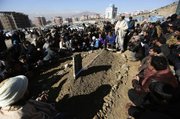KANDAHAR, Afghanistan -- The killing of five diplomats from the United Arab Emirates in a bombing in southern Afghanistan marks the deadliest attack ever for the young nation's diplomatic corps, though it's too soon to tell who was behind it or if the Gulf envoys were even the targets.
The federation of seven sheikhdoms, founded in 1971 on the Arabian Peninsula, said it would fly the nation's flag at half-staff for three days in honor of the dead from the attack Tuesday in Kandahar.
The Taliban denied planting the bomb, even as the insurgents claimed other blasts Tuesday that killed at least 45 people. No other group immediately claimed responsibility for the attack in Kandahar, a province in Afghanistan's Taliban heartland.
The bomb targeted a guesthouse of Kandahar Gov. Homayun Azizi, who was wounded in the assault along with UAE Ambassador Juma Mohammed Abdullah al-Kaabi. The attack killed 11 people and wounded 18, said Gen. Abdul Razeq, Kandahar's police chief, who was praying nearby at the time of the blast.
Razeq said investigators believe someone hid the bomb inside a sofa at the guesthouse. He said a construction project there may have allowed militants to plant the bomb.
"Right now we cannot say anything about who is behind this attack," he said, before adding that several suspects had been arrested.
Dubai's ruler, Sheikh Mohammed bin Rashid Al Maktoum, who is also the United Arab Emirates prime minister and vice president, offered condolences for the families of the dead and condemned the attack.
"There is no human, moral or religious justification for the bombing and killing of people trying to help" others, he wrote on Twitter.
On the Afghan side, authorities said the dead included two lawmakers, a deputy governor from Kandahar and an Afghan diplomat stationed at its embassy in Washington.
The bombing occurred ahead of a U.S. report issued Wednesday that said Afghanistan needs a stable security environment to prevent it from again becoming a safe haven for al-Qaida and other militants, but Afghan security forces have not yet become capable of securing all of the country by themselves.
The report, by the U.S. government's office of the special inspector general for Afghanistan, offered a high-risk list assessment for the war-torn country, two years after NATO-led foreign combat forces pulled out, leaving only a smaller training and assisting mission behind.
The office of the special inspector general for Afghanistan, which provides independent oversight of U.S. reconstruction funds for Afghanistan, also noted that despite the fact that more than half of all U.S. reconstruction funds since 2002 has gone toward building, equipping and training Afghan forces, they still have lost territory to the Taliban.
"To combat the Taliban and other threats, the United States has provided more than $64 billion since 2002, including $3.45 billion in fiscal year 2016 alone, to support the Afghan National Army, the Afghan National Police, and the Afghan Air Force," the report quoted Inspector General John Sopko as saying.
The inspector general's office cited U.S. Defense Department reports that say Afghan forces are "generally capable and effective at protecting major population centers, preventing the Taliban from maintaining prolonged control of specific areas, and at responding to Taliban attacks."
Tuesday's attack inside the heavily guarded compound represents a major breach of security, even in Afghanistan. Afghan President Ashraf Ghani on Wednesday condemned the attack and ordered an investigation.
The Taliban usually are quick to take credit for attacks, particularly those targeting the government or security forces. The militants claimed attacks earlier Tuesday in Kabul at a compound of government and legislative offices that killed at least 38 people and wounded dozens. Another Taliban-claimed suicide bombing on Tuesday killed seven people in Lashkar Gah, the capital of Helmand province.
But on Wednesday, the Taliban issued a short statement blaming an "internal local rivalry" for the Kandahar attack.
The Taliban have denied some attacks in the past that diplomats and security forces later attributed to the group. Other insurgent groups, including an Islamic State affiliate, also operate in Afghanistan.
United Arab Emirates combat troops deployed to Afghanistan after the 2001 U.S.-led invasion that toppled the Taliban, who had harbored al-Qaida before and after the Sept. 11 attacks. The UAE had troops there for years as part of the NATO-led mission, training members of the Afghan armed forces and often winning the support of locals by praying with them in community mosques and respecting their traditions as fellow Muslims.
Multiple daily commercial flights link the countries, with Dubai serving as an important commercial hub for Afghan businessmen. Over the years, Taliban and Afghan officials also have met in Dubai to try to start peace talks.
Abu Dhabi's powerful crown prince, Sheikh Mohammed bin Zayed Al Nahyan, said Tuesday's attack wouldn't stop the UAE's humanitarian efforts abroad.
He wrote on Twitter: "We will not be discouraged by despicable terrorist acts carried out by the forces of evil and darkness."
Information for this article was contributed by Rahim Faiez, Amir Shah and Adam Schreck of The Associated Press.
A Section on 01/12/2017

